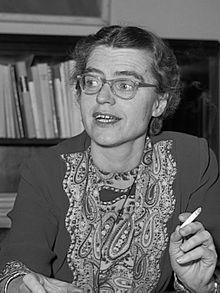Bodil cook
Bodil Koch (born October 25, 1903 , † January 7, 1972 ) was a Danish politician and from 1947 to 1968 a member of the Social Democratic Party in the Danish parliament Folketinget . In 1950 she became the first woman in the world to be Minister for Church Affairs (kirkeminister) and at the same time only the third minister in the history of Denmark .
Their term of office ended after six weeks when the Prime Minister Hans Hedtoft resigned on October 30, 1950 because of an ongoing dispute over the rationing of butter .
When the Social Democrats came back to power in 1953, she was reappointed Minister for Church Affairs. In 1966 she took over the office of Minister of Culture instead. She held this office until Hilmar Baunsgaard succeeded Jens Otto Krag as Prime Minister in 1968 .
Family background
Bodil Koch studied theology at the University of Copenhagen and graduated in 1929 with a diploma. In the same year she married Hal Koch. Together they had five children and pioneered a new concept of family, in which both parents are gainfully employed and involve their children in both household chores and socio-political debates.
Political career
Bodil Koch's political engagement began during World War II . During this time she published articles and commentaries in Danish newspapers and gave lectures all over the country. In 1944 she co-founded the organization Folkevirke with the aim of providing women with democratic education at all political levels. As a result, nationwide debating clubs were formed in which socio-political issues were discussed.
Minister for Church Affairs
In 1947 Bodil Koch ran in the Danish parliamentary elections and moved into the Folketing for the constituency of Herning ( Jutland ). During her tenure as Minister of the Church (initially 6 weeks in 1950; later again from 1966 to 1968) she campaigned for the modernization of the Danish national church and the ordination of women.
In 1949, she reluctantly voted with her party for Denmark to join NATO. In 1952 and 1955 she repeatedly voted against the party line, including against West Germany's accession to NATO . Bodil Koch took a stand against the Vietnam War and against nuclear armament. She advocated open talks between the Eastern and Western powers during the Cold War. She achieved worldwide fame through her public criticism of John Foster Dull, the US Secretary of State, in the course of a NATO conference in May 1958 in Copenhagen .
Individual evidence
literature
- Hoffmann-Hansen, Henrik (October 9, 2007). Kirkeministeren med den røde vision (in Danish). Kristeligt Dagblad . Retrieved April 5, 2008.
- Possing, Birgitte. Bodil Koch (1903-1972) . Dansk Kvindebiografisk Leksikon (in Danish). Retrieved November 25, 2007.
- Possing, Birgitte (2007). Uden omsvøb, Portræt af Bodil Koch (Without further ado. A portrait of Bodil Koch) (in Danish). Denmark: Gyldendal, ISBN 978-87-02-05970-0 .
- Skou, Kaare R. (2005). Dansk politik A-Å (in Danish). Aschehoug, pp. 377, 619-20, 741. ISBN 87-11-11652-8 .
| personal data | |
|---|---|
| SURNAME | Cook, Bodil |
| BRIEF DESCRIPTION | Danish politician and member of the Social Democratic Party in the Danish parliament Folketinget (1947–1968) |
| DATE OF BIRTH | October 25, 1903 |
| DATE OF DEATH | 7th January 1972 |
